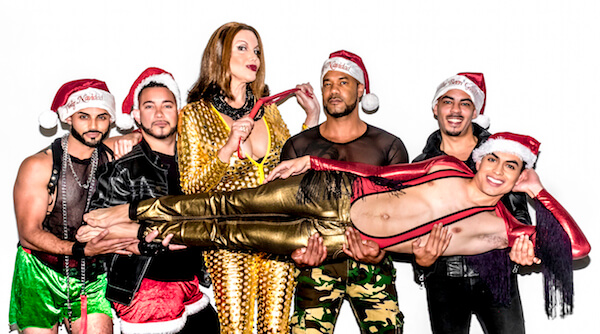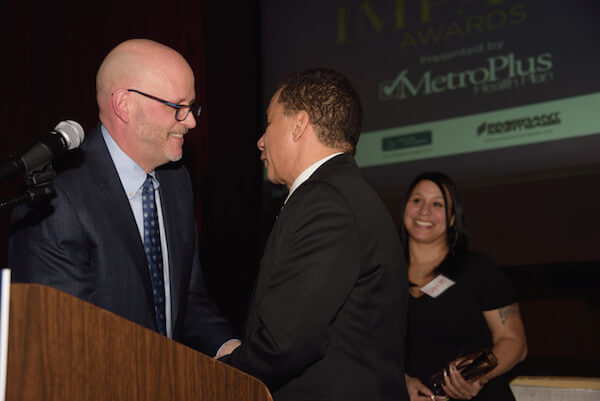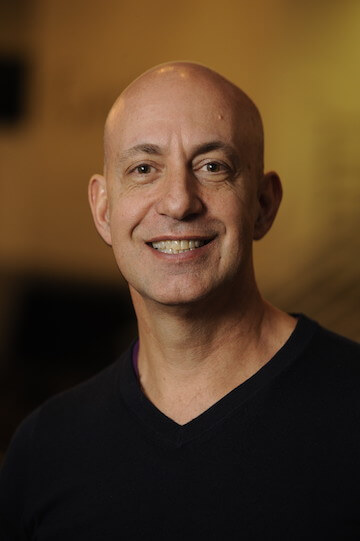Alison Bechdel accepts the Lambda Literary Foundation’sBoard of Trustees Award for Excellence in Literature. | MICHAEL LUONGO
BY PAUL SCHINDLER | Kate Clinton, the wry and brainy comedian who is a tireless emcee for all sorts of LGBT community gatherings, set the tone right at the top of the June 2 Lambda Literary Awards.
“Have you noticed some premature LGBT triumphalism out there?,” she asked, perhaps thinking of several recent books from New York Times writers that have suggested the battle for equal rights is won, or nearly so.
Clinton then recalled that David France, the writer and filmmaker (“How to Survive a Plague”), told her about scouring the library at Kalamazoo College decades ago and finding only three gay books — one of them actually a book by Gay Talese. The comedian said that when people comment to her about the remarkable advance of LGBT rights, she tells them, “Well, it wasn’t so fast — we did a 45-year Kickstarter campaign.”
Lambda book awards recognize the diversity and urgency of LGBT writing
The point of the lighthearted reins Clinton applied to our self-satisfaction was clear — “That’s why LGBT writers are so important.” That theme was reinforced throughout the evening at Cooper Union — by writers and publishers working to keep genres alive and encourage new types of work, by voices from communities little heard from until recent years, and by activists from around the globe.
Veteran editor David Groff — in accepting the LGBT Anthology award for “Who’s Yer Daddy?: Gay Writers Celebrate Their Mentors and Forerunners,” which he co-edited with Jim Elledge — noted that the anthology genre, dependent as it is on a multitude of contributors, “from the beginning has been essential to LGBT lives and literature.”
Teresa DeCrezenzo presented the Dr. Betty Berzon Emerging Writer Awards — named for her late partner, a trailblazing psychotherapist and writer — to Charles Rice-Gonzalez and Imogen Binnie. Rice-Gonzalez, author of “Chulito,” said his writing has helped him “embrace my Bronx workingclassness, embrace my gay Latinoness.” Binnie, the author of “Nevada,” said the emerging body of transgender fiction encourages a “new level of realness” in telling people’s stories.
The audience gave an especially warm welcome to Alison Bechdel, the renowned cartoonist, graphic novelist, and memoir writer, who received the Lambda Board of Trustees Award for Excellence in Literature. The creator of the “Dykes to Watch Out For” comic series who won critical acclaim for her 2006 graphic memoir, “Fun Home,” recalled the shyness she felt coming to New York from Vermont in 1991 to accept her first Lammy, and said, “And now 23 later, I feel no less intimidated by all of you, I feel no less awkward, and no less grateful to be part of this.”
When Bechdel, in turn, gave the LGBT Graphic Novel Award to Nicole J. Georges for “Calling Dr. Laura: A Graphic Memoir,” Georges said, “I started crying when I heard Alison speaking. It is hard to be a graphic artist and a woman and a homosexual. When I was a kid and found a comic by a homosexual or by a weirdo or by a gender weirdo, it kept me alive in suburban Kansas.”
Rigoberto Gonzalez, who won the Gay Poetry Award for “Unpeopled Eden,” was born in California and raised in Mexico. Dedicating the award to his father, who died in 2006 and like his mother did not know how to read or write and performed migrant work, Gonzalez said, “They made a conscious decision to make sure I was born in this country… I want to thank them for that.”
Kate Bornstein speaks after receiving Lambda Lit’s Pioneer Award. | MICHAEL LUONGO
Kate Bornstein, a performance artist and writer, whose books — from 1994’s “Gender Outlaw: On Men, Women, and the Rest of Us” to 2012’s “A Queer and Pleasant Danger: A Memoir” — are bedrocks of the transgender literary canon, spoke with colorful passion about the importance of the LGBT community celebrating the “terrific sex” it has and its “fabulous gender” expression, but also argued that more needs to be done to take on social and economic class issues. After acknowledging her battle with cancer, Bornstein said, “So I want to say this: Please watch out for each other, please watch each other’s backs.”
Accepting the LGBT Children’s/ Young Adult Award for “Two Boys Kissing,” David Levithan talked about how, even with the unconditional love of his family, “I felt alone.” He explained simply, “Young people need to see themselves.”
Chinelo Okparanta, who won in the Lesbian Fiction category for her novel “Happiness, Like Water,” underscored the international reach of LGBT literature.
“I’m from Nigeria,” she told the crowd. “Thank you for promoting human rights.”
In their remarks, Lambda Lit executive director Tony Valenzuela and board president S. Chris Shirley urged the audience to open up their wallets to support the group’s annual weeklong summer retreat for emerging writers, which has welcomed 250 fellows since it was launched in 2007. Last year, the group raised about $30,000 for scholarships for 33 of the 45 fellows, and it hopes to attract enough support to fund the expenses of all of its participants this year.
For a complete list of the June 2 winners, visit lambdaliterary.org.




































